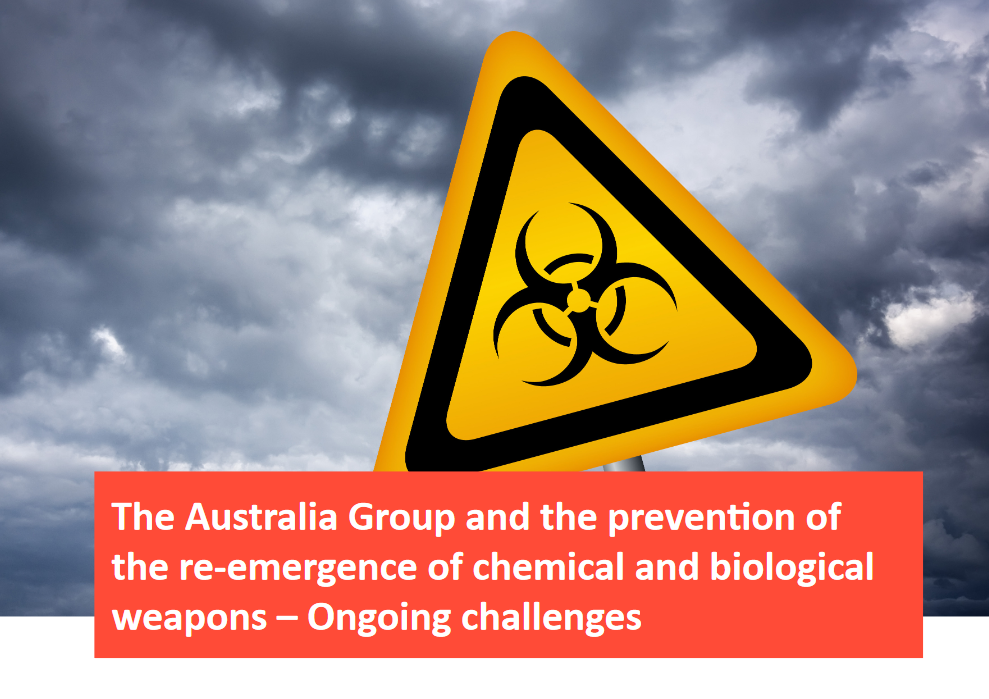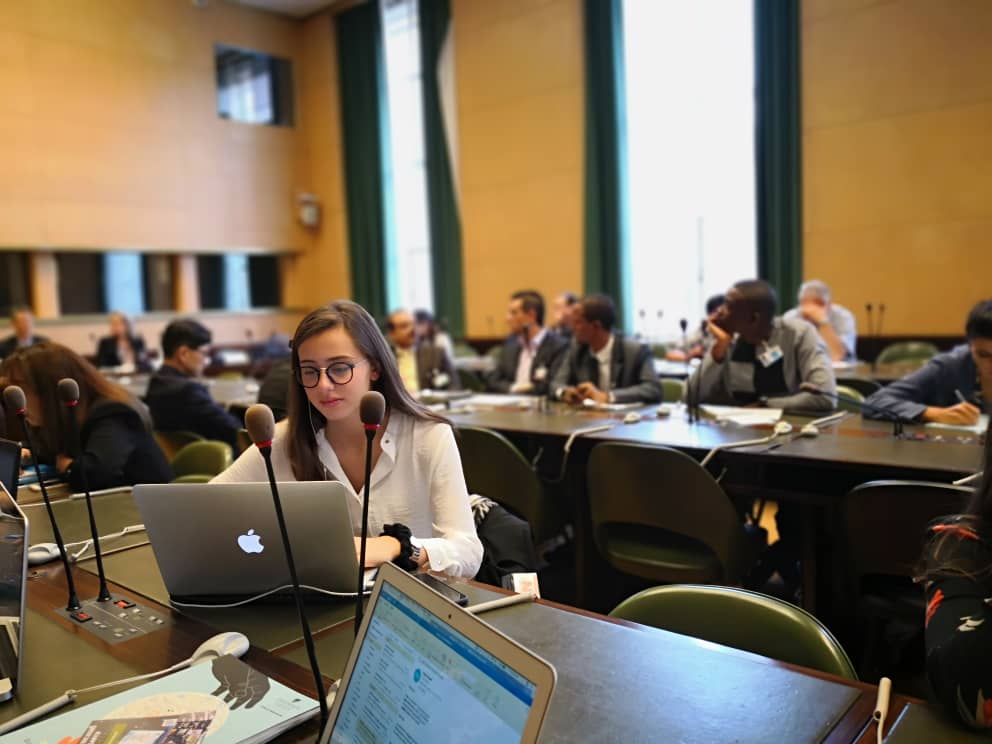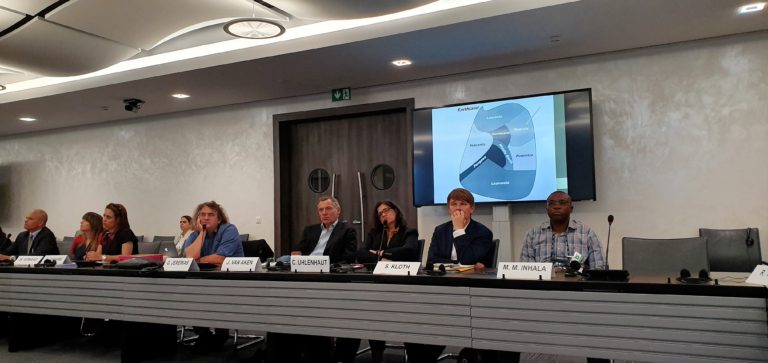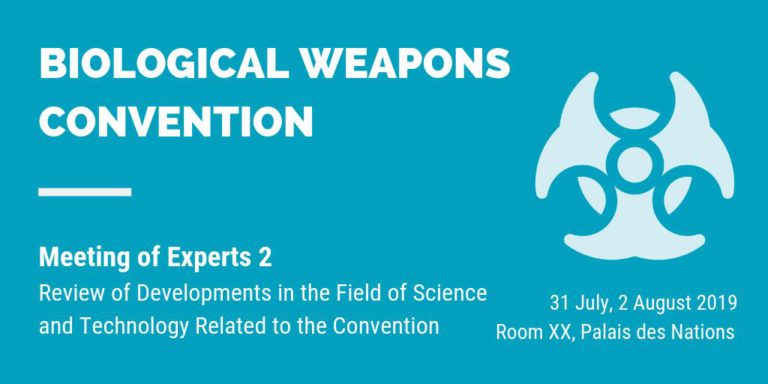Education for disarmament and non-proliferation
Building a culture of responsibility: education for disarmament and non-proliferation Journal of Strategic Trade Control, Special Issue, Vol. 2 (September 2024) I am honoured to have been invited to contribute to the Special Issue of the Journal of Strategic Trade Control (JoSTC) focussed on Training programs to counter current and emerging biological and chemical proliferation risks: themes, practices, and lessons learnt. Between January 2018 and December 2023, I was involved in the design, development and implementation of a master’s course on dual-use technology transfer control, which was implemented in Central Asia through the International Science and Technology Centre (ISTC) and …
The Australia Group and the prevention of the re-emergence of chemical and biological weapons
The European Union Non-Proliferation and Disarmament Consortium held its 11th Consultative Meeting in Brussels on 15 and 16 September 2022. Its central theme was the “Topicality of multilateral export control regimes”. On the second day, one of the four breakout sessions addressed the Australia Group, an informal arrangement coordinating technology transfer controls relating to dual-use agents and equipment with potential relevance for developing and producing chemical and biological weapons. Introducers were Ms Esmée de Bruin (Netherlands), Dr Mónica Chinchilla (Spain) and Ms Élisande Nexon, PharmD (France). I had the honour of moderating the session. The three speakers have different backgrounds, …
Disarmament education: Road-testing a master’s course on CBRN dual-use technology transfer controls
From 17 until 28 June I ran an Executive Course on Export Control at the M. Narikbayev KAZGUU University in Nur-Sultan (formerly Astana), Kazakhstan. Its goal was twofold. First, it tested in a real university setting parts of a master’s course on chemical, biological, radiological and nuclear (CBRN) dual-use technology transfer controls I have been developing since February 2018. Its second purpose was to attract interest in organising the full master’s course from other Central Asian academic institutes. Set in the broader context of peace and disarmament education, the Executive Course posed considerable challenges from the perspective of educational methodology …
Blog 1 – Experiences of a student at the Meetings of Experts of the Biological and Toxin Weapons Convention
I am Chiara Barbeschi and study Security Studies (BSc) at Leiden University in the Netherlands. Interning at The Trench and representing the non-governmental organisation (NGO) as a Research Associate at the five Meetings of Experts (MXs) of the Biological and Toxin Weapons Convention (BTWC) is an incredible opportunity that Jean Pascal Zanders granted me. Blogging about it is a chance of sharing my perspective, impressions and account of the conference. I know that there are also the daily factual reports Richard Guthrie writes and distributes in the meeting room. My posts convey the thoughts of a student experiencing the BTWC meetings for the first time. MX1 (29 – …
Third tabletop exercise on emergency assistance in case of biological weapon use – First impressions
The day after the presentation of the report on the Article VII tabletop exercise (TTX) held in Lomé, Togo on 29 and 30 May to the states parties of the Biological and Toxin Weapons Convention (BTWC), the Fondation pour la recherche stratégique (FRS) and the BTWC Implementation Support Unit (ISU) ran another TTX in the United Nations building in Geneva. This time the focus was on a series of anthrax outbreaks that affected mostly herd animals, but also led to multiple human casualties. The scenario was a deliberate attempt to break with the habitual simulations of increasingly dire human pandemics. After all, the BTWC covers …
Blog 2 – Experiences of a student at the Meetings of Experts of the Biological and Toxin Weapons Convention
This second blog post covers both the second and third Meetings of Experts (MXs) of the Biological and Toxin Weapons Convention (BTWC). MX2 on science and technology took place on 31 July and 2 August (the day in between being the Swiss national day); MX3 on strengthening national implementation of the BTWC was a one-day event on 5 August. MX2 impressions Like at the start of the week I was still sitting behind The Trench nameplate, which was formally represented for the first time in these five MXs of 2019. MX2 was chaired by Mr Yury Nikolaichik of Belarus who decided to …
Deciding on emergency assistance in case of biological weapons use
Today, in the Palais des Nations in Geneva we presented the report on the Tabletop Exercise (TTX) on the Implementation of Article VII of the Biological and Toxin Weapons Convention (BTWC), which the Fondation pour la recherche stratégique (FRS) and the BTWC Implementation Support Unit (ISU) organised in cooperation with UN Regional Centre for Peace and Disarmament (UNREC) organised in Lomé, Togo on 28–29 May 2019. Being one of the more obscure provisions in the BTWC, Article VII only attracted state party attention over the past ten years or so. In follow-up to the decision of the 7th Review Conference (2011), parties to the convention looked for the …
How the Convergence of Science, Industry and Military Art Slaughtered Innocence
Keynote speech at the CONDENsE Conference, Ypres, Belgium, 29 August 2019 Good evening ladies and gentlemen, colleagues and friends, It is a real pleasure to be back in Ieper, Ypres, Ypern or as British Tommies in the trenches used to say over a century ago, Wipers. As the Last Post ceremony at the Menin Gate reminded us yesterday evening, this city suffered heavily during the First World War.Raised to the ground during four years of combat, including three major battles – the first one in the autumn of 1914, which halted the German advance along this stretch of the frontline …
Understanding the Dutch export licence requirement for publishing life science research
During the Meeting of Experts of states parties to the Biological and Toxin Weapons Convention (BTWC) last August, the Netherlands organised or co-hosted three side events relating to safeguarding the life sciences. A significant incident, in which the Dutch virologist Ron Fouchier and his team were required to obtain an export licence to publish their research on how they had mutated H5N1 into an aerosol-transmissible avian influenza virus variant, undeniably informed the need to clarify national policies and approaches to biorisk management. A month earlier the Appellate Court had annulled the ruling by a lower court in support of the …








